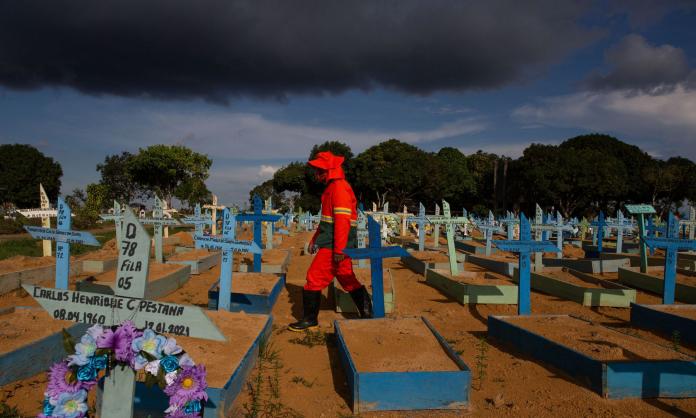Brazilian President Jair Bolsonaro has denied the severity of the pandemic, and his government’s inaction is responsible for the death of more than 2,000 people every day. It has been called a genocide by many, the official death toll surpassing 400,000 (a number probably well below the actual figures).
Besides not attempting to contain the spread of the coronavirus—there has been no national lockdown—he has not used the public health system for mass testing and has not prepared it to deal with an increased number of hospitalisations. To add insult to injury, Bolsonaro has mocked all regional efforts to deal with the pandemic.
Brazil’s ruling class was incapable of responding to the health crisis. Its aversion to spending on public services prevented any substantial action. Proof of the complete chaos at the top has been the constant change in health ministers, including, at one point, 122 days without one.
Without national coordination and leadership, a mosaic of approaches (often none) is visible throughout the country.
Even though regional governments use different rhetoric, their policies and actions are usually similar. Because they are not as far removed as the national government is from the people suffering, regional governments had to do something. But it was always too little too late. State or regional lockdowns have been implemented only when healthcare services approached collapse—when there were no more intensive care beds available, for example.
Many COVID-19 patients have died waiting for emergency care. Those who can get admitted to a hospital still face intensive care units that are under-resourced in many regions. Brazil has gone through a long period of dismantling public services, which intensified in recent years with constitutional amendments curtailing spending on public health and education. Many hospitals lack essential medicines such as oxygen or those needed to keep patients safely sedated when putting them on a ventilator.
Brazil has also been going through a long period of economic crises. While the federal government reserved 1.2 billion reals (about A$290 million) in financial aid for the banks at the start of the pandemic, it provided a meagre financial support for those already struggling to make ends meet—600 reals per month in the first few months, and now just 150 reals (about A$35) a month for single adults.
It is unsurprising that the number of people thrown into extreme poverty has skyrocketed. According to a report released in December by the Brazilian Research Network on Sovereignty and Food and Nutritional Security, 117 million people are in a situation of food insecurity or are going hungry. That’s more than half of the population.
While Brazil is still experiencing the worst of the pandemic, hope lies with the vaccines. Unfortunately, the lack of willingness to provide them has resulted in a major delay in acquisitions. So far, only 5 percent of the population is fully vaccinated—a sharp contrast to what Brazil has already proved to be able to do in previous national vaccination campaigns, such as during the H1N1 flu in 2010, when half the population was vaccinated in a few months.
Even the limited rollout of vaccines has been viewed as an opportunity to attack public services. The government and parliament approved a two-tier program, allowing private businesses to obtain vaccines directly and administer them to employees. This is utterly irrational, since the centralised state with its national health system should be the most efficient way to buy, distribute and deliver vaccines. But the neoliberal impetus does not rest. The message spread by the mainstream media is that all governments are slow, and private businesses are the solution.
The private corporate media, apart from occasional light criticisms, have been pivotal in providing cover for the government’s murderous negligence. Instead of highlighting Bolsonaro’s culpability, from the very beginning the TV channels and major newspapers placed the responsibility on individuals.
We are told daily by “reputable” news sources that the situation is bad, not because of the lack of public health policies—such as investment in mass testing, contact tracing, economic support for effective isolation of confirmed or suspected cases, more hospital beds, more intensive care unit equipment and so on—but because of the selfishness and complete lack of regard on the part of the public.
This all is spiced by plenty of fake news. This far-right machine of lies has been used to distract and spread confusion among the population, particularly in rural areas. Bolsonaro himself is a top fake news creator and spreader. The broadsheet Folha de São Paulo quoted him saying: “The side effects of the masks are beginning to appear here. A German university says they are harmful to children”.
Bolsonaro’s negligence and inaction during this pandemic are criminal. His far-right government has proven to be a killing machine.










